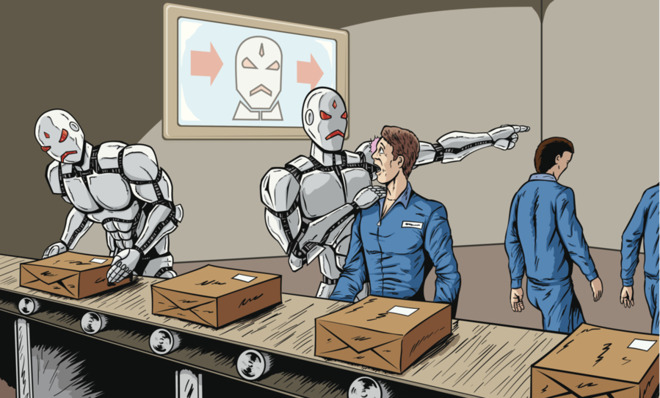Could a robot do my job?
Probably, but I'm still optimistic

The word robot comes from the Czech robota, meaning "drudgery" or "servitude." Robots are — by definition — machines created to perform tasks human workers would rather not do.
And yet there are two sides to this. As robots become more sophisticated and better at doing things deemed too boring, dangerous, or expensive for humans, they may endanger something that most of us rely upon: paying jobs.
When I go to the supermarket, I often use the automated checkout. I follow the instructions of the disembodied voice — to scan my item, to place it in the bag, and then to insert my card and pay. It sometimes becomes confused about where I have placed the item, and needs to be reset by a human attendant, but otherwise it runs smoothly, customer after customer. The supermarket doesn't need to pay it a wage. It only needs to pay for the hardware, and then pay one attendant to watch over four or six automated checkouts.
The Week
Escape your echo chamber. Get the facts behind the news, plus analysis from multiple perspectives.

Sign up for The Week's Free Newsletters
From our morning news briefing to a weekly Good News Newsletter, get the best of The Week delivered directly to your inbox.
From our morning news briefing to a weekly Good News Newsletter, get the best of The Week delivered directly to your inbox.
And this pattern isn't just playing out for cashiers — it's playing out for food servers, bank tellers, telephone operators, receptionists, mail carriers, travel agents, typists, telemarketers, stock market traders. And the next target? Office workers. As Randall Parker, Professor of Economics at East Carolina University, recently wrote: "Robots and other automated equipment have increased factory automation so much that factories are a dwindling source of all jobs. The next big target for automation has been and continues to be office work."
One recent study suggested up to 80 percent of jobs could be automated, leading me to ask a question many are probably asking themselves: are robots coming for my job?
They're certainly coming for journalists — in March this year the Los Angeles Times published a piece written by automated software to report on an earthquake. But that is an automated story, from a template created by a human. For weather reports, financial reports, earthquake reports — things that can be written out from a template — this will probably become increasingly common, and faster and maybe more accurate than if it were done by humans.
Lucky for me I am paid to write arguments rather than report. I would guess that kind of role is safe, at least for now. Robots can't have opinions (or emotions or novel ideas) or make original arguments yet because they're not yet self-aware and are limited to routine tasks that follow precise procedures within set parameters.
A free daily email with the biggest news stories of the day – and the best features from TheWeek.com
So while it's possible to program a robot — let's call him the Hack-Bot 3000 — to spew out words based on things I or others have written in the past, they wouldn't really be original, authentic arguments. Until the point that robots like the Hack-Bot 3000 can be programmed to be genuinely self-aware and intellectually active (something which is at least decades and decades away, and may even be impossible), they'd be a pale rehash.
This is a key quality of a robot economy. As a 2010 project between Brookings' Hamilton Project and the Center for American Progress illustrated, the human refuge from automation fits into two categories: 1.) Abstract tasks that require opinions, imagination, original ideas, situational adaptability, or just a "human touch" — think lawyers, doctors, artists, and those pesky humans who have to design and program the robots. 2.) Manual jobs whose tasks are too varied and interpersonal to be easily automated, like personal assistants, janitors, home health aides, and security personnel. In other words, high-skill and low-skill jobs are in while "middle-skill" jobs, like many office and factory workers, are out.
It's easy to imagine the ramifications if this trend continues. In one outcome, corporations — trying to maximize their profits by employing cheaper and more efficient robots — could end up severely damaging the economy through massive unemployment. In fact, tech-based productivity gains are probably one reason why the recovery from the 2008 financial crisis has been relatively lackluster for the masses, while great for corporations who own the (first wave of) robots. When the vast majority of work in the economy is fueled by labor, people willing to work harder than you can climb up the ladder. But when a vast majority of the work done in the economy is based on owning robots — who can produce things cheaply, including more robots — inequality between humans may become much more entrenched.
And this is what has happened to date. That Center for American Progress/Brookings study noted that technology has been a large contributor to income inequality, as the middle class lose their "middle-skill" jobs and have to duke it out for lower-wage, unskilled jobs.
So, is this the road to a nightmarish, dystopian future?
Even if the vast majority of workers displaced by robots can't find new jobs in industries where humans have an innate advantage over robots, I think there is hope, if only because corporations rely on consumer spending for revenues. If the economy is disemboweled by a lack of consumer spending, corporations fat off the self-perpetuating riches of automation and plentiful, cheap energy will likely be all too happy to support generous redistributive programs to support the spending of the hordes of out-of-work people, like a universal basic income. Inequality can often only go so far before it snaps back and damages the rich, and a little redistribution may be a small price to pay to support consumer spending and quell the anger and riots of the unemployed (for, as they say, "the devil will find work for idle hands to do"). Of course, it might take a lot of riots, mass protests, and civil unrest (or even wars) for this to occur.
And in the longer run cheap robots and cheap computing combined with cheap, decentralized energy might even make "unemployment" a feasible choice, rather than a living hell. Imagine a house of the mid 21st century — powered by wind turbines and solar panels (and a very large battery for storage), equipped with a greenhouse for growing crops, an electric self-driving car, robots that can clean the house and repair technology, a 3-D food printer that can purify water and turn waste into food, a mechanical 3-D printer that can produce new equipment and parts to repair or upgrade computers and robots. The basic technology to produce that kind of setup — where homes become pretty much self-sufficient and self-sustaining — already exists. In that environment, a job and income could become completely optional.
That doesn't sound so bad, though. Say I am rendered obsolete in 20 or 50 years by the Hack-Bot 3000 and his encyclopedic knowledge, perfect grammar, impeccable sense of humor, wild imagination, and thoughtful sentence construction. I — and lots of other people displaced by robots — will be able to live happily, either self-sufficiently, or on government subsidy. Free to explore the world, compose an opera, learn to play the saxophone, write a novel (though everyone will probably be reading Philip K. Dick-Bot). Maybe even travel to space.
So yes, the robots are coming for our jobs. For my job. But I'm still optimistic about that.
John Aziz is the economics and business correspondent at TheWeek.com. He is also an associate editor at Pieria.co.uk. Previously his work has appeared on Business Insider, Zero Hedge, and Noahpinion.
-
 The Salt Path Scandal: an ‘excellent’ documentary
The Salt Path Scandal: an ‘excellent’ documentaryThe Week Recommends Sky film dives back into the literary controversy and reveals a ‘wealth of new details’
-
 AI griefbots create a computerized afterlife
AI griefbots create a computerized afterlifeUnder the Radar Some say the machines help people mourn; others are skeptical
-
 Sudoku hard: December 17, 2025
Sudoku hard: December 17, 2025The daily hard sudoku puzzle from The Week